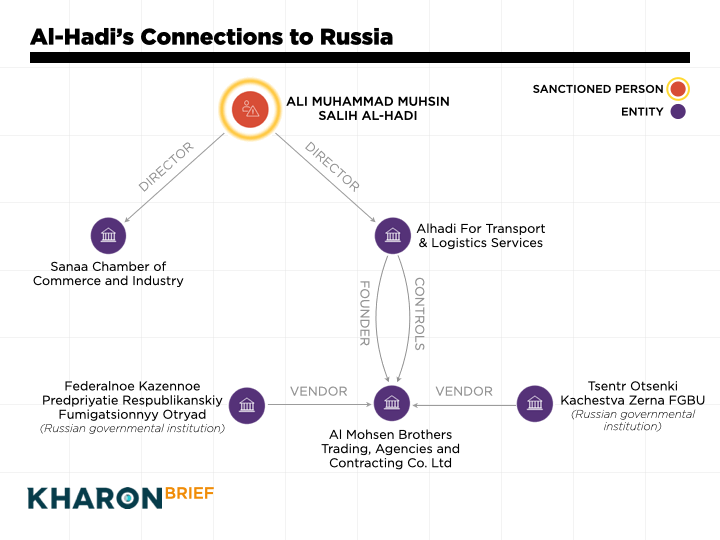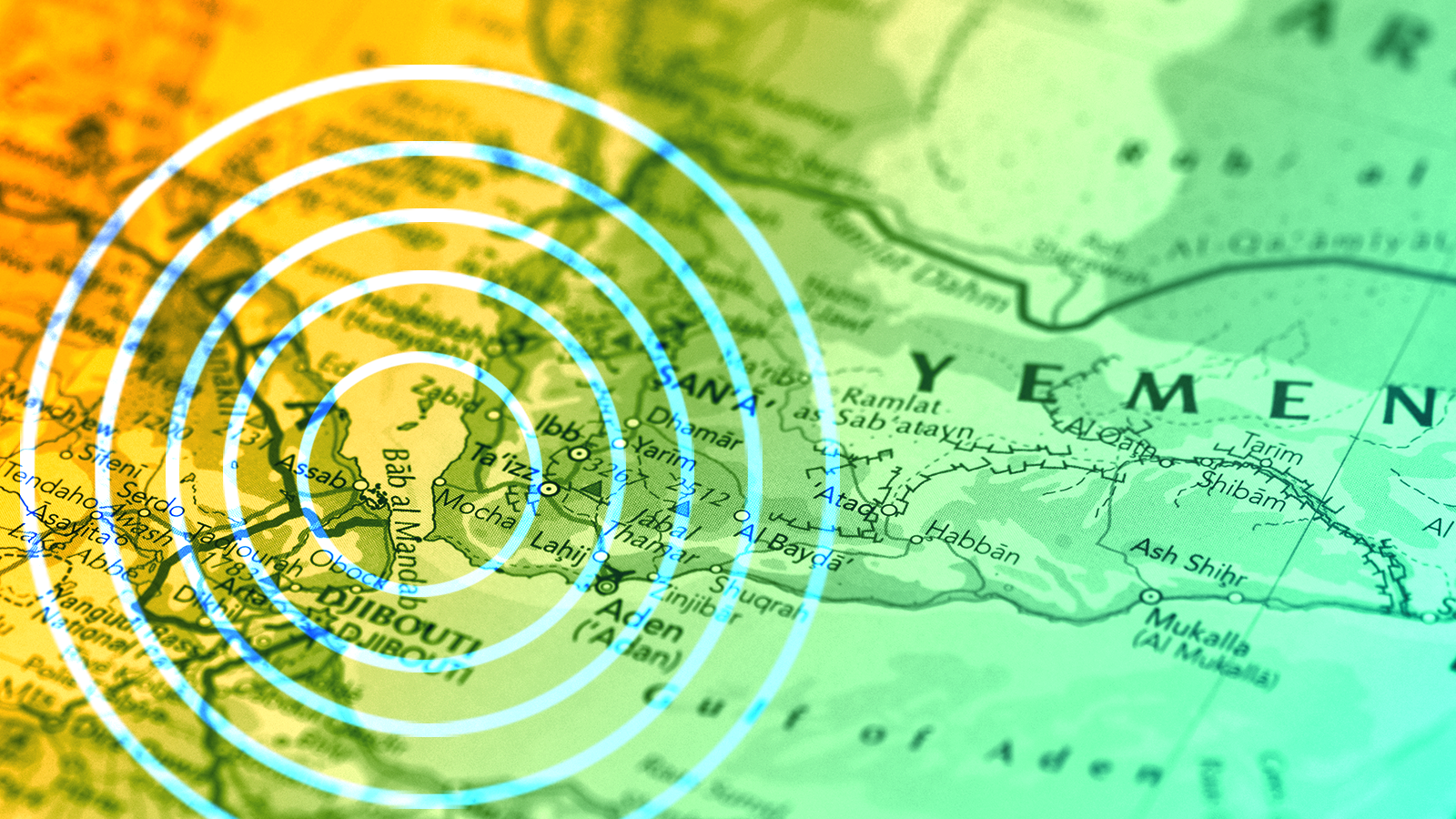Tensions in the Red Sea have escalated over the past week as the United States launched airstrikes against Yemen’s Houthi rebels, who claimed to strike a U.S. naval vessel in response. The exchange came less than two weeks after the Trump administration re-designated the Iran-backed proxy group as a Foreign Terrorist Organization (FTO) and sanctioned high-ranking Houthi officials for their roles in smuggling and procuring weapons from Russia into Yemen.
Since November 2023, a month after the war in Gaza started, the Houthi rebels have attacked over 100 vessels in the Red Sea, including American commercial and naval vessels, killing four sailors and sinking two ships, according to news reports. The group has said the attacks’ goal is to disrupt Israel-linked shipping in the region.
President Trump said the U.S. will continue to use lethal force against the Houthis if they stop American vessels from sailing freely.
A recent Kharon investigation zeroed in on one of the Houthi officials whom the U.S. designated, a key facilitator of Houthi weapons procurement.
Backstory: The Houthis are a main combatant in Yemen’s ongoing civil war who, like Hezbollah in Lebanon, have long received financial and military support from Iran.
The U.S. and U.K. previously launched airstrikes against the Houthis in January 2024, in what then-President Joe Biden called a “direct response to unprecedented Houthi attacks against international maritime vessels in the Red Sea.”
The Trump administration’s latest strikes against the Houthis follow its renewal, last month, of a “maximum pressure” campaign against Iran.
Soundbite: “No terrorist force will stop American commercial and naval vessels from freely sailing the Waterways of the World,” Trump said. “Our economic and national security have been under attack by the Houthis for too long.”
Inside the network: Among this month’s sanctioned Houthi officials was the financier Ali Muhammad Muhsin Salih Al-Hadi, head of the Houthi-controlled Sanaa Chamber of Commerce. According to the designation statement, Al-Hadi has used that role and an unnamed shell company to fund and obfuscate purchases of military-grade equipment on the Houthis’ behalf. He also has traveled to Russia to “secure defense equipment for Houthi militants and investment in Houthi-controlled industries,” Treasury said.
A Kharon investigation identified a broader network of companies tied to Al-Hadi, including logistics and food companies based in Yemen, Oman and Egypt. After Al-Hadi’s designation, the Sanaa Chamber of Commerce confirmed in a social media post that he had visited Russia but said it “was to secure the local wheat market” and “had no political motive.” A Yemeni media outlet speculated in March 2024 that an Al-Hadi trip to Russia had been intended to secure new potential weapons sources.
Kharon could not verify those claims, but immediately following this reporting, trade records indicate that a company Al-Hadi controls—Al Mohsen Brothers Trading, Agencies and Contracting Co. Ltd—received several shipments labeled as industrial fumigation equipment and electrical components from two Russian governmental institutions.
Since November 2023, a month after the war in Gaza started, the Houthi rebels have attacked over 100 vessels in the Red Sea, including American commercial and naval vessels, killing four sailors and sinking two ships, according to news reports. The group has said the attacks’ goal is to disrupt Israel-linked shipping in the region.
President Trump said the U.S. will continue to use lethal force against the Houthis if they stop American vessels from sailing freely.
A recent Kharon investigation zeroed in on one of the Houthi officials whom the U.S. designated, a key facilitator of Houthi weapons procurement.
Backstory: The Houthis are a main combatant in Yemen’s ongoing civil war who, like Hezbollah in Lebanon, have long received financial and military support from Iran.
The U.S. and U.K. previously launched airstrikes against the Houthis in January 2024, in what then-President Joe Biden called a “direct response to unprecedented Houthi attacks against international maritime vessels in the Red Sea.”
The Trump administration’s latest strikes against the Houthis follow its renewal, last month, of a “maximum pressure” campaign against Iran.
Soundbite: “No terrorist force will stop American commercial and naval vessels from freely sailing the Waterways of the World,” Trump said. “Our economic and national security have been under attack by the Houthis for too long.”
Inside the network: Among this month’s sanctioned Houthi officials was the financier Ali Muhammad Muhsin Salih Al-Hadi, head of the Houthi-controlled Sanaa Chamber of Commerce. According to the designation statement, Al-Hadi has used that role and an unnamed shell company to fund and obfuscate purchases of military-grade equipment on the Houthis’ behalf. He also has traveled to Russia to “secure defense equipment for Houthi militants and investment in Houthi-controlled industries,” Treasury said.
A Kharon investigation identified a broader network of companies tied to Al-Hadi, including logistics and food companies based in Yemen, Oman and Egypt. After Al-Hadi’s designation, the Sanaa Chamber of Commerce confirmed in a social media post that he had visited Russia but said it “was to secure the local wheat market” and “had no political motive.” A Yemeni media outlet speculated in March 2024 that an Al-Hadi trip to Russia had been intended to secure new potential weapons sources.
Kharon could not verify those claims, but immediately following this reporting, trade records indicate that a company Al-Hadi controls—Al Mohsen Brothers Trading, Agencies and Contracting Co. Ltd—received several shipments labeled as industrial fumigation equipment and electrical components from two Russian governmental institutions.

Kharon users can explore this Insight in greater detail through the ClearView platform.
The Treasury designated seven top Houthi officials in all, including:
Kharon identified further companies and facilitators in Russia, Oman and Yemen that were linked to Al-Jabri, too.
- Mohammad Abdulsalam, the Houthis’ Oman-based spokesman. Treasury said in its designation statement that Abdulsalam had met with Russian Ministry of Foreign Affairs personnel in Moscow and coordinated Houthi meetings with Russian military personnel “to secure weapons and other support.”
- Mahdi Mohammed Hussein Al-Mashat, the chairman of the Houthi-aligned Supreme Political Council, whom Treasury said “has worked to increase cooperation” between the Houthis and the Russian government, including President Vladimir Putin.
Kharon identified further companies and facilitators in Russia, Oman and Yemen that were linked to Al-Jabri, too.







